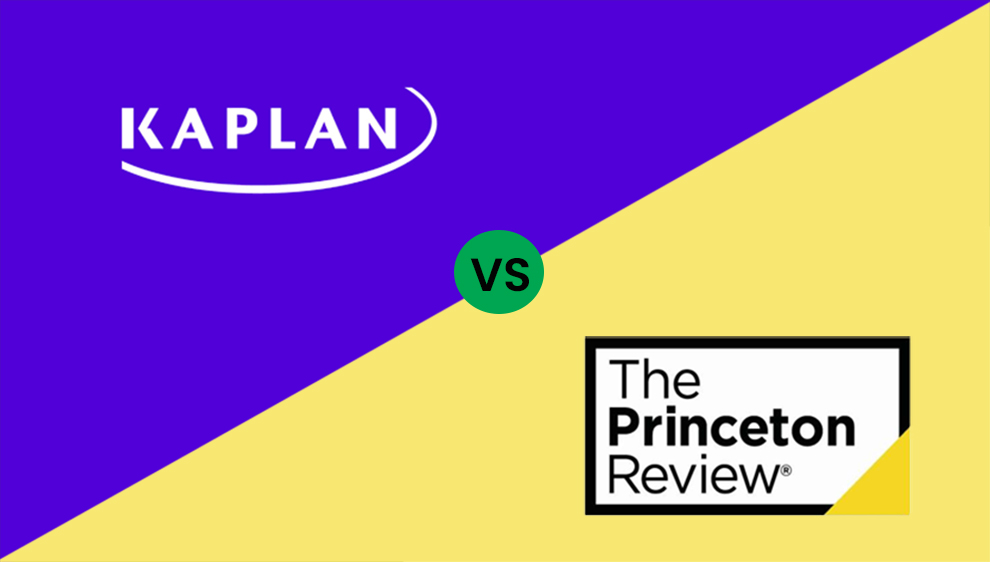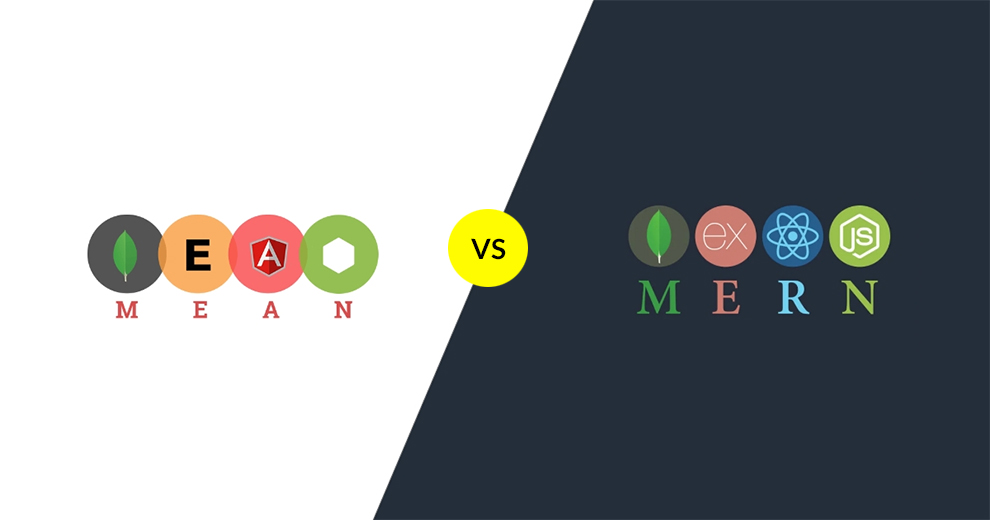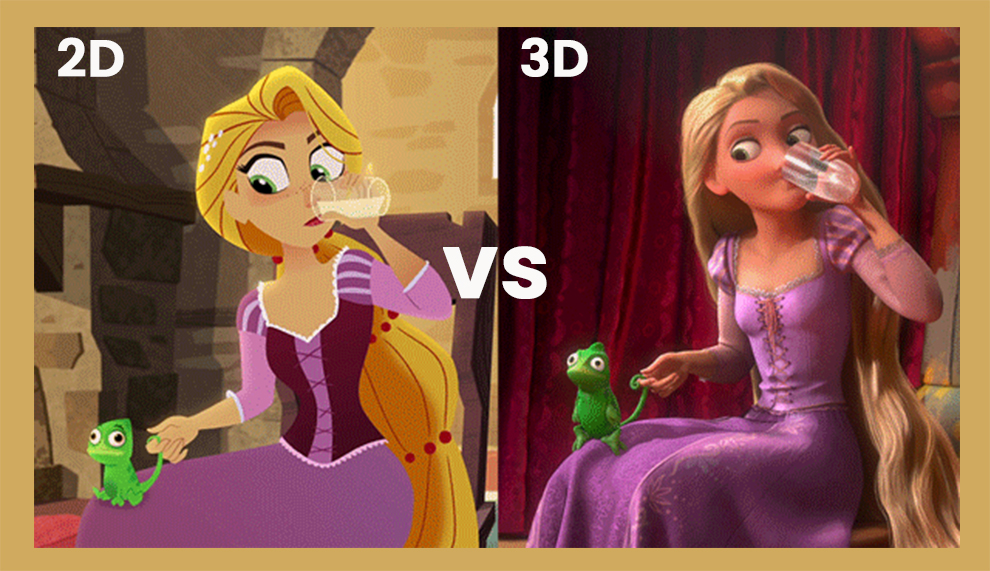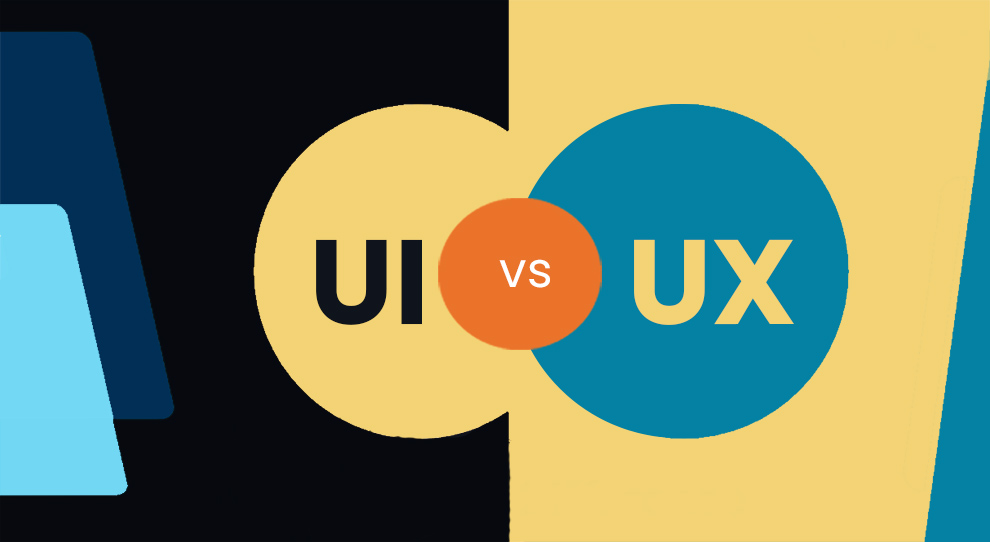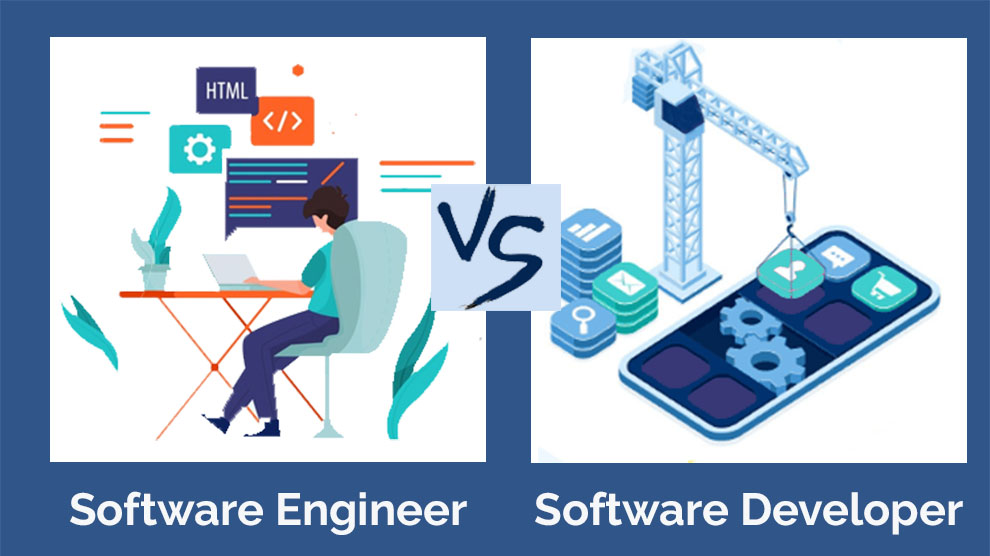Kaplan is good in itself but when you compare it to Princeton Review, Princeton Review turns out to be an overall better pick with specialized instructors and better books.
Both companies have relatively similar preparation packages that are self-paced, in-person, and online, with detailed boot camp courses. While Princeton Review is a little more expensive, it also has some unique guarantees making it a superior pick. Moreover, Princeton Review is also good with deals and offers.
However, in terms of the quality of coursework, there is a tie between them. They have their respective strengths within the category, but their curriculums are well-developed and thorough.
But from Kaplan vs Princeton Review MCAT, the former has top-quality video-based instruction, whereas the latter’s video lessons are not the best.
But Princeton has a better problem explanation and practice material, and their subject matter team has a better approach to teaching the course. There is no generalist but a rotating team of subject matter experts leading every session.
Princeton’s hard-copy books are their highlight. These are well-written and thorough and convey even the trickiest topics easily, but Kaplan is also a close second. In practice tests, the two are almost head-to-head.
Kaplan’s production value is way better than Princeton, but Princeton Review ranks higher in the access window as they give you year-round access, which is only six months with Kaplan.
Preparing for an MCAT course demands you to enroll in a prep course that fits well in your budget, suits your studying style, and helps you achieve your goals.
Kaplan and Princeton Review are undoubtedly two of the most renowned premium MCAT prep course providers. Several students explore different options, and the choice usually narrows down to Kaplan vs Princeton Review MCAT.
Is Princeton Review Better Than Kaplan?
| Attributes | Kaplan | Princeton Review |
| Cost | $2599 | $2799 |
| Refund | Yes | Yes |
| Access duration | 6 months | 365 days |
| Free trial | 7-day | 14-day |
| Practice tests & questions | 17 papers and 3000+ questions | 16 tests and 2500+ questions |
| Live classes | 42 hours | 40 hours |
| Video lessons | 130+ lessons | 500+ lessons |
| Customized learning plan | Yes | Not so much |
| Success guarantee | Not generous | One of the best |
| Ease of use | Better | Not as good |
| Website | Visit Kaplan | Visit Princeton Review |
Is Kaplan better than Princeton Review for MCAT? Please read our detailed review as we compare the two on multiple attributes and help you decide between these two outstanding companies.
A. Pricing and course options you get Kaplan vs Princeton MCAT
Princeton Review though relatively costlier is better than Kaplan.
With Kaplan, you receive various class options to choose from. You can pick from their five prep classes that differ in delivery. These include:
- Private Tutoring + Live Online
- Live Online Course
- On-Demand Course
- Bootcamp
- In-Person Course
It differs from Princeton Review’s offerings, which primarily vary on top prep materials, guarantees, level of instruction, and not delivery format.
Their on-demand option is the most pocket friends and is for students who wish to prepare online and at their pace. You do not get classroom components. So, you will rely on coursework, video lessons, and hardcopy study material. It costs approximately $2000, which matches Princeton’s price.
A step-up is their on-demand course, a live session wherein the students meet at regular times online via webcast, and the instructor will deliver the lessons. It is your typical online class and costs around $2600.
However, if you wish to meet the students in your class in person, you can opt for their in-person session, wherein you will meet with others in a classroom setting for three-hour sessions 14 times.
Typically the classes meet near or on the college campus in a rented space and cost $3000. But there is always a good deal on this format, and you can snag in a good deal.
Kaplan also offers a combination of live and private lessons, which includes a one-on-one session to their typical online package. It will cost approximately $3300.
Lastly, their Bootcamp class is the most expensive one. It is an intensive preparatory course where you meet for five weeks, and the whole study session is compacted into less than a month and a half. It is extremely pricey at $7000.
On the contrary, Princeton Review has four-course options:
- Live Online
- MCAT 515+ Immersion
- MCAT 513+
- Self-Paced
Naturally, the self-paced version is the most pocket-friendly and is ideal for students on a budget or anyone who likes flexible study patterns. It costs $2000, almost comparable to Kaplan’s on-demand option.
Next is their live online plan, labeled as their flagship option. It costs around $2800, a couple of 100 dollars higher than Kaplan’s live class. However, Princeton justifies this price difference with a vast difference in the hours of video instruction. (500 against 130 from Kaplan).
Next in line is the Princeton Review MCAT 513+ option. It is somewhat similar to the live session in access, content, and instruction, but their added guarantee primarily distinguishes it.
As per Princeton, if you completely take this class, you will score 513 or more on the MCAT. It is a unique offering, but available at a high price of $3500. However, you can find several offers on it routinely.
Lastly, MCAT 515+ Immersion, an option that is directly analogous to Kaplan’s Bootcamp. It condenses several months of study into five weeks of daily preparation. Herein, Princeton offers another guarantee.
So, if you complete the whole class, you will score 515 or more on the MCAT. But it is a costly session at $7350 and is recommended for students more serious with their preparation.
B. Kaplan vs Princeton Review MCAT books
Princeton Review books are more detailed and offer an easier understanding of the contents.
Princeton Review and Kaplan offer physical books for the students who shop for their prep courses. It is an excellent attribute, as reading an online textbook is often challenging, and several providers do not send physical books anymore.
Kaplan offers a seven-book MCAT set, and the count is ten with Princeton Review. Both books are informative, well laid out, and of good quality.
However, in Princeton vs Kaplan MCAT books, Princeton has a better implementation in their books with the online software. Students are told what and when to read and mark their progress with the software.
C. Who gets you guaranteed success for MCAT, Kaplan or Princeton Review?
Both courses offer a score guarantee, but the Princeton Review has more generous guarantee plans that take you beyond the basic high score guarantee. They have specific MCAT score guarantees of 515+ and 510+. So, you can pick as per your requirement.
It is always a good idea to have a course that guarantees success. Even though both have a good score guarantee, Princeton Review outranks with its generosity, which also shows in its costs. Hence, these options are ideal for students who wish to amplify their chances of getting selected into a top medical school.
D. Who has a better content and course structure between Kaplan and Princeton Review?
We like Princeton Review in how they organize the content. They follow a pre, during, and after-class organization method.
Upon comparison, we established that these platforms offer equally good quality content that can help you absorb the content and learn it more efficiently. With Princeton Review, you get over 500 videos in their Live Online and self-paced courses. They have shorter videos that are concise and to the point. But sadly, they are not the most engaging. But do well at teaching you the concepts you must know.
With Kaplan, you get over 130 videos in live online and self-paced classes. So, you may feel that Princeton has a vaster video content than Kaplan. But that is not true, as Kaplan follows a different approach in their videos. They have some two-hour-long lectures and a few shorter ones.
Moreover, Princeton is more organized in its content delivery and structure. They detail what you must do before the lecture, during the class, and after the session.
But is Princeton Review or Kaplan better for MCAT in the content aspect? Their practice question availability is almost comparable. So, while Princeton has over 2500 questions, Kaplan offers more than 3000 practice questions.
Lastly, both provide excellent explanations for all the questions. It can help you understand the concepts better to assess whether you are right or wrong.
E. Princeton Vs Kaplan user experience
Kaplan has a clear edge in how their videos are laid out. They have several added features that provide better control and extra information.
They both have excellent interfaces, but Princeton Review has a relatively more old-school interface and does not contain the bells and whistles that most other platforms provide. Regardless, it is easy to navigate and is very simple.
On the contrary, Kaplan has a relatively more contemporary feel. Their interface feels more updated and modern. Kaplan is very easy to navigate and use.
F. Instructor-wise Is Kaplan or Princeton Review better for MCAT?
Kaplan instructors do an excellent job of communicating even the trickiest concepts most straightforwardly. They are also very approachable. But Kaplan has an MCAT generalist expert teach you the whole class. So, there is no concept of different professionals covering different sections.
On the contrary, in Princeton Review, there is no generalized teaching but a rotating team of subject matter experts leading every session. Thus, there is an assurance that the professional teaching a subject knows it thoroughly.
G. Score analytics and reports
Princeton Review had a relatively cleaner reporting system that is easy to understand.
Fortunately, both Kaplan and Princeton Review provide a detailed score report. Every type of report is available in each of their courses. It is a good feature and lets you break down every MCAT section and subsection within the topic. It makes it easier to analyze where you went wrong and what you most struggled with.
H. Video or live lessons – Who offers what?
From Kaplan vs Princeton Review MCAT course, the former has better production quality and lessons.
Kaplan’s on-demand lessons are good in instruction and content review. Their production value is top-notch, with crisp audio and sharp picture, which is lacking in Princeton Review.
Moreover, the videos also contain uniform webcam-style instructor intro in every video, digital whiteboard, interactive graphics, and other additional factors, which make their videos worth every buck.
Beyond the format, the content delivered via the video lessons is also excellent. Each lesson takes you in-depth into the topic it covers and presents a fantastic refresher for undergrad classes.
Moreover, their instructor offers several handy analogies and mnemonics that make it easy to recall the required information and formulas. So, if you are a visual learner, Kaplan should be a clear choice.
Related: Barrons Vs Princeton Review | Kaplan Vs Barbri |Kaplan Vs Princeton Review GRE | Magoosh Vs Kaplan GRE| Magoosh vs Kaplan MCAT| UWorld vs Kaplan NCLEX
Is The Kaplan MCAT Course Worth It?
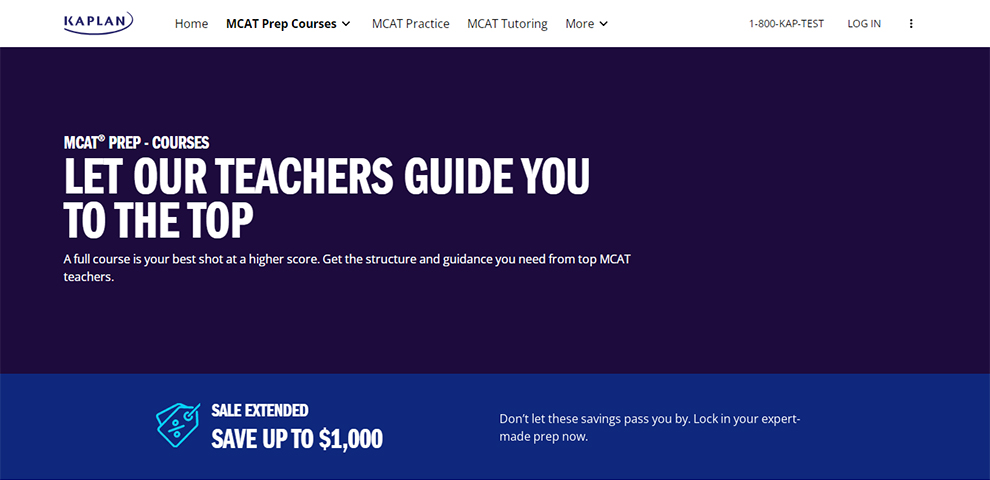
Definitely! It merely depends on what you expect from the class. Their Question Bank or QBank is one of their top selling points. You get over 3000 questions that are well-drafted and designed to mimic the difficulty level you will find in the actual MCAT exams.
Further, they produce personalized courses depending on the length, sub-topic, topic, type, and difficulty level. Thus, the students can work better on their weak areas and get better at them. So, QBank from Kaplan should be a good choice if you learn better with practice questions.
In addition, their live and recorded classes are well-drafted and educational. They employ a whiteboard tool that incorporates the videos with text while teaching. Thus, they cater well to visual and auditory learners. That’s not all.
Their production quality is the highest we have seen so far. Both video and live instructors are experts, and the country’s oldest test preparation company has trained them well in presenting the material with superior efficiency and clarity.
They also have several practice tests that let you gauge your skills before appearing for the exam. Every test is realistic in the sense of their preparedness and focuses on the areas you struggle with. But like every other platform, it has its pitfalls.
Firstly, they have lesser live courses than others. So, if you are interested in more in-person instruction, between Kaplan vs Princeton Review MCAT, Princeton Review is a better fit.
Moreover, their guarantee is not as generous. They only guarantee one-point improvement, which is useless compared to the Princeton guarantee. Lastly, their access window is not as long as the other companies.
| Pros | Cons |
|
|
Is The Princeton Review MCAT Course Worth It?
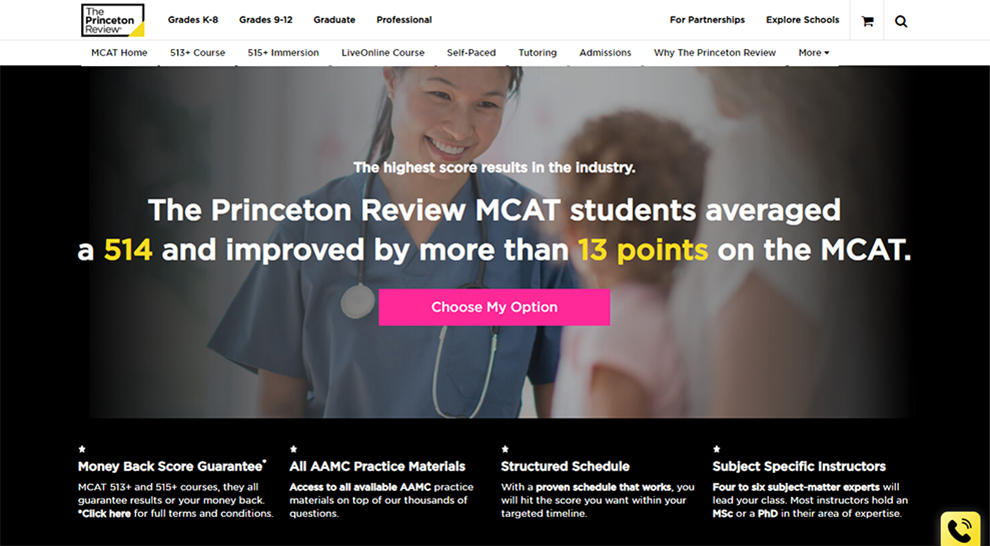
100 percent! But like Kaplan, it has some standout attributes while a few other pitfalls. Firstly, their live classes are engaging and interactive. They also offer more hours than any other competitors in this space.
They have specialized experts and no generalists to teach you particular subjects. So, students can get their queries solved by someone holding deep knowledge. Please remember their live classes are only a top-up from the video instructions.
Princeton Review books are better laid out than Kaplan. They give you full explanations and ample study material. That’s not all. They regularly update the books to keep them the latest and apt as per the exams.
Princeton Review offers the best guarantee for their high-end premium courses of a minimum score improvement of 10 points. It is far better than most other companies. But like Kaplan, it too has some shortcomings.
Their courses can be expensive for those on a budget. Typically, their classes are $100-200, costlier than Kaplan’s. They also have fewer practice questions than Kaplan and are not very easy to use as QBank from Kaplan. Lastly, their best guarantee is solely available in their most expensive courses.
| Pros | Cons |
|
|
Final Verdict – Which is Better, Princeton Review or Kaplan for MCAT?
Both Princeton Review and Kaplan MCAT are top-quality prep courses. There is no surprise that the two are the industry’s hot picks. But, if we have to pick one over the other, we would choose Princeton Review.
The Princeton Review offers more review books and live instruction hours. Their video lessons are more substantial, and their live classes are comprehensive. Of course, it is expensive, but it is worth the money.
But if you wish to save a couple of 100 dollars, Kaplan is also a safe choice. We conclude that there is a tiny margin between the two, but Princeton Review is somewhat better.

